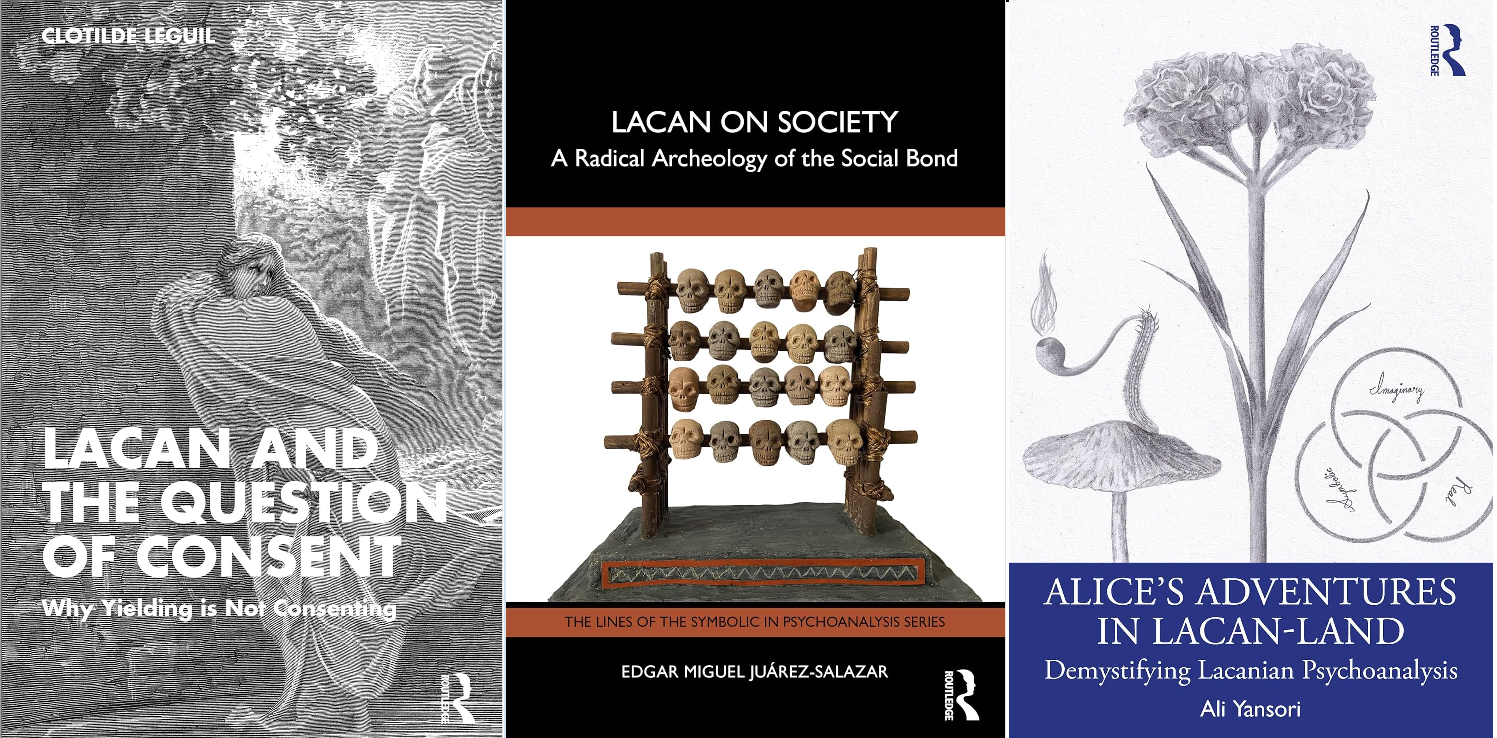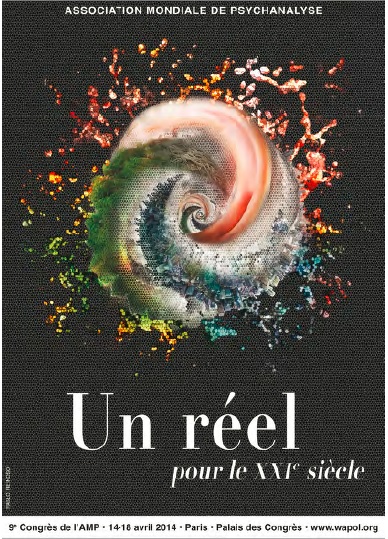Sign up to the Newsletter to receive monthly updates on the latest Lacanian news
New Publications
Lacan and the Question of Consent: Why Yielding is Not Consenting by Clotilde Leguil, translated by Domitille Krupka, is an intriguing new title that has just been published by Routledge. Exploring the boundary between these two terms, Leguil attempts to go beyond the legal or contractual sense of ‘consent’ to highlight its ambiguity on one hand and separate it from the experience of coercion on the other. Contrasting the ‘we’ of rebellion to the ‘I’ of consent, she examines the impact of the #MeToo movement, the paradoxical effects of sexual liberation, and the frontier at the level of the body between “to yield” and “to consent.”
Alice’s Adventures in Lacan-Land: Demystifying Lacanian Psychoanalysis by Ali Yansori is also new from Routledge and uses Lewis Carroll’s famous stories to introduce Lacan’s main ideas around identity, truth, and alienation in a way that aims to be accessible for those less familiar with Lacan’s work. Lacan was a fan of Carroll’s and there are occasional references to him in the Seminars of the 1950s and 1960s. At one point, he praises the two Alice books with the curious quip that they are “almost a poem of phallic avatars” (Seminar VI, 4th March 1959). In the mid-sixties Lacan even went on French radio to deliver a homage to Carroll (which you can listen to here).
Lacan on Society: A Radical Archeology of the Social Bond by Edgar Miguel Juárez-Salazar was published by Routledge last month and traces Lacan’s thinking on society throughout his work, from his critique of ‘family complexes’ in the early 1930s, his engagement with structural anthropology in the 1940s and 1950s, and his commentary on Marx and the nature of enjoyment in the 1960s and 1970s. “This archeological reading is a critique of knowledge in Lacan’s terms”, Juárez-Salazar writes in the introduction. His reference to archaeology here evokes Lacan’s use of the term in Radiophonie from 1969 where he says that an archaeology of knowledge is more than just its history, it puts structure to work (Autres écrits, p.433).
A Lacanian Foundation For Critical Pedagogy by Alex J. Armonda was published by Bloomsbury in August. Combining a reading of Lacan with the work of Brazilian educator and philosopher Paulo Freire, Armonda argues that Freire’s problem-posing approach to education aligns to the work of the unconscious in producing “something new, unexpected, and significant…. something other, something in excess of what was planned” which, like the unconscious, is not only significant but generative. In addition to Lacan, Armonda draws on the work of Frantz Fanon, Alenka Zupancic, and Slavoj Žižek to offer a critical introduction to psychoanalysis in the social, political, and philosophical foundations of education.
Monstrosity and the Psychoanalytic Dimensions of the Uncanny by Rodrigo Gonsalves is another new title from Routledge released in August. Using both Freud’s and Lacan’s work to examine the notion of the uncanny, Gonsalves traces the emergence of the idea from aesthetics to psychoanalysis before considering it as a way to address contemporary experiences of anguish, desire, suffering and alienation as part of a “monstrous grammar for psychoanalysis.”
Lastly among publications, readers will be pleased to know that a date has been set for publication in English of Lacan’s Seminar XIV, The Logic of Fantasy. Edited by Jacques-Alain Miller and translated by Adrian Price, it is due to be published in April 2026 but is available for pre-order now.
New Videos
On YouTube, Lacanian scholar Todd McGowan gives his take on the best books for approaching Lacan’s work. His list, in chronological order, includes works in both English and French and encompasses titles that lean towards the explication of Lacan’s ideas via culture, politics and philosophy rather than those which provide detailed commentaries on Lacan’s texts. Worth checking out.
Lacanian analyst Stephanie Swales was the guest on Daniel Tutt’s podcast last month to discuss ‘Perverse Cruelties in the Age of the Capitalist Discourse’, a topic drawn from her contribution to the volume Lacan’s Cruelty: Perversion beyond Philosophy, Culture and Clinic, which appeared in 2022 edited by Meera Lee. Among other things Swales discusses Lacan’s four discourses, the capitalist discourse (which Lacan adds as a ‘fifth discourse’ in his Milan lecture of 1972), and the concept of liminality with reference to modern post-pandemic phenomena like digital nomadism.
A recording of Bogdan Wolf’s presentation entitled ‘Unknown Love’, which was given to Initiative Toronto in July, is now also available on YouTube. Wolf discusses the effects of transference, the supposition of knowledge, and the incarnation of object a by the analyst among other topics.
Upcoming Events
Starting on 26th September, Prof. Dr. Samuel McCormick’s Lectures on Lacan will begin a new series on Seminar XXII, R.S.I. (1974-1975). In addition to sharing recorded lectures with registered participants there will be several online discussions in this series with the goal of making this key text in Lacan’s later teaching clear, coherent, and accessible.
Starting in October, Jason Childs and Derek Hook will be running a seminar series on ‘Lacanian Diagnostic Structures and Clinical Technique.’ This seminar will consist of 22 sessions in total, finishing in April 2026. All sessions will run for approximately two hours on Saturdays at 3pm Paris time (9am New York / 2pm London / 6am Los Angeles / 4pm Beirut / 11pm Sydney). More details and the application form are available via the link above.
New Resources
Some great new and updated rarities on Freud2Lacan.com this month, courtesy of excellent translations by Anthony Chadwick alongside Richard G. Klein. Translations of Lacan’s work span his early and late periods. From the early years, we have a 1928 contribution Lacan gave on abasia in a case of war trauma (number 6 on the Lacan page) alongside Marc Trénel, who was head of department at the Maison Blanche psychiatric hospital and who later gets an affectionate mention in Lacan’s Ecrits paper on psychical causality. Next, two texts from 1931: Lacan’s presentation on folies simultanée (sometimes known as folie à deux, number 13 on the Lacan page) and his co-authored presentation with J. Lévy-Valensi and Pierre Migault on ‘“Inspired” writings: Schizography’, available here with Anthony Chadwick’s translation alongside Russell Grigg’s (number 17 on the Lacan page). From the later period of Lacan’s teaching, we have translations of interventions that Lacan made at his colleagues’ presentations in the early 1970s. These include remarks on papers by his analysand and pupils Claude Conté on the drive (number 162), Serge Leclaire on object a (number 161), and Serge Zlatine on technique (number 158). Lacan’s 1973 intervention at the EFP Congress in La Grande-Motte near Montpellier, translated by Anthony Chadwick, is also newly available (number 171).
Got news? Get in touch.
Sign up to the Newsletter to receive monthly updates on the latest Lacanian news



